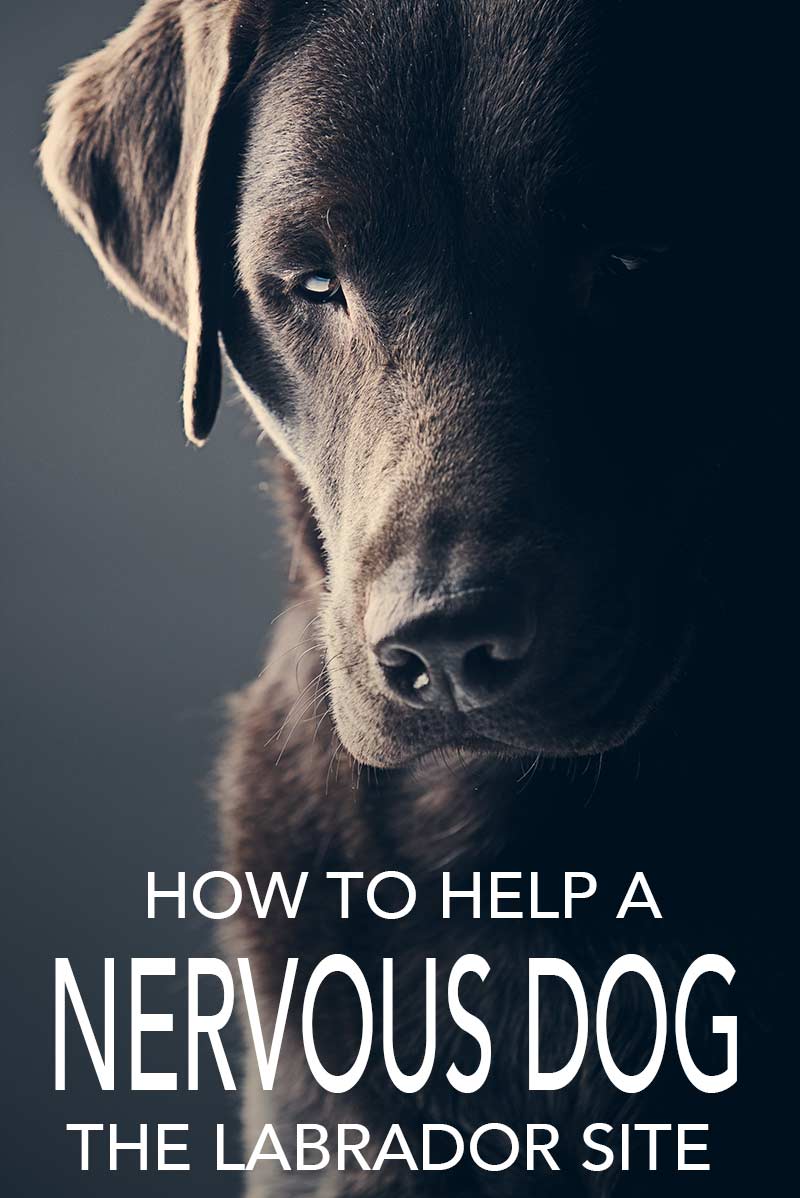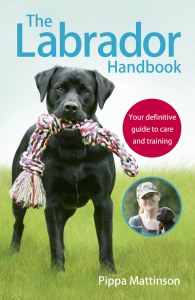Nervous Dog: Help With Canine Fears And Phobias
We don’t usually think of a Labrador as a nervous dog. But canine fears and phobias are a serious business and can occur in any breed. If you have a nervous Labrador Retriever you are not alone. When your Labrador is really scared, you want to help.
This is a resource page for anyone with a nervous dog. That includes dogs that are nervous about one particular type of activity – swimming for example. And dogs that are just generally anxious. You’ll find help for your scared Labrador and links to information on some of the most common canine fears and phobias in these articles
What makes a dog a nervous dog?
There are many causes of nervousness in dogs. The leading cause is lack of socialization during the critical period of puppyhood. This is a very important developmental phase that all puppies pass through, during which they are especially receptive to new experiences, and to making friends. This period – known as the socialization window – ends at 13 to 14 weeks of age. Beyond that, puppies are likely to be wary of experiences that seem strange or very different from anything that they have known before.
A puppy that has not had a wide range of experiences before reaching that critical three month point will be more prone to fearfulness. And more likely to become a nervous dog as he grows up. Especially if no further efforts are made to socialize him in the future.
Genes and the nervous dog
Of course, environment isn’t everything. Some dog are temperamentally pre-disposed to nervousness than others. And to a certain extent the personality of a nervous dog may be inherited. The problems caused by an inherited tendency to nervousness can be mitigated by socialization but sometimes not be avoided altogether. That’s why occasionally, a very well socialized dog will still display signs of nervousness throughout the rest of his or her life.
Hormones and the nervous dog
There is growing evidence to show that sex hormones are involved in fearful or nervous behavior in dogs. A recent study on Hungarian Vizslas for example showed that castrated dogs were significantly more likely to develop a fear of storms. Testosterone is considered to be a confidence boosting hormone for male dogs. Removing it by neutering a dog, either surgically, or chemically with implants, may induce nervousness.
It’s important to discuss this with your vet before neutering your dog, especially if your dog is inclined to be fearful. Your vet may recommend a trial run with a hormone implant to observe the effects on your nervous dog, before making the decision to operate.
Unusual experiences
Very frightening experiences may sometimes have occurred in the history of a nervous dog. A dog that is involved in a road traffic accident may become steadfastly afraid of cars for example.
If the dog is generally confident, this may not affect other aspects of her life. But in any case, it’s a good idea to discuss with your vet as they may be able to help your dog overcome his specific fear with the right treatment plan.
Does is matter if my dog is nervous?
Owning a nervous dog is a big responsibility, because no matter how kind and gentle your dog is, nervousness in dogs increases the risk that the dog will bite. Aggression and fear in dogs is tightly linked, and if any dog is scared enough the possibility of that dog biting is always a risk. So, not only will your dog be happier if he is helped to overcome his fears, he will also be a safer dog to be around.
Training methods
Traditional training methods using punishment and dominance reduction techniques have been shown to increase aggression in dogs. In a study of over 140 dogs, a quarter of dogs that were subjected to punishment reacted with aggression. This is because punishment deters behavior by inducing fear.
Modern dog training methods are now available that don’t use punishment at all. And it is doubly important that only these methods are used on any dog that is inclined to be nervous. All the training guides on this website are based on modern positive reinforcement training methods.
Avoiding fears and phobias
One of the best ways to avoid your Labrador puppy becoming a nervous dog is to ensure that she is well socialized.

Getting help
If your Labrador is often scared, and you are struggling to help him, a visit to your vet is in order. He or she will make sure that there are no underlying health issues upsetting your dog, and in some cases may be able to treat your dog himself.
Separation anxiety for example sometimes responds to treatment with drugs that your vet can prescribe. In other cases, your vet will refer you to a behaviorist who will help you make some changes in your routines, that will help your dog, to be happy and confident. Sometimes a combination of temporary treatment with drugs combined with behavior therapy works best.
You’ll also get help and support in our forum, where there are many knowledgeable dog parents, some of whom have first hand experience of owning and managing a nervous dog.
Safety first
Remember, a frightened dog may bite if approached. Never attempt confrontational behavioral modification techniques such as ‘flooding’, or ‘dominance reduction‘ which can make matters far worse. Check with your vet before using methods suggested on this or any other website. And always get professional help if you cannot make progress in resolving problems at home

If you’d like all of our best Labrador information together in one place, then get your copy of The Labrador Handbook today. The Labrador Handbook looks at all aspects owning a Labrador, through daily care, to health and training at each stage of their life.
You can buy The Labrador Handbook from Amazon by following this link(paid link). If you do, The Labrador Site will receive a small commission which is greatly appreciated and won’t affect the cost to you!
References and further reading
- King J, et al. Treatment of separation anxiety in dogs with clomipramine: results from a prospective, randomized, double-blind, placebo-controlled, parallel-group, multicenter clinical trial. Applied Animal Behavior Science. 2000.
- Overal K, et al. Understanding the genetic basis of canine anxiety: phenotyping dogs for behavioral, neurochemical, and genetic assessment. Journal of Veterinary Behavior. 2006.
- Zink C, et al. Evaluation of the risk and age of onset of cancer and behavioral disorders in gonadectomized Vizslas. Journal of the American Veterinary Medical Association. 2014.
- Herron, et al.Survey of the use and outcome of confrontational and non-confrontational training methods in client-owned dogs showing undesired behaviors. Applied Animal Behavior Science. 2009.

Free Labrador Updates!
Get my training tips, news, reviews, and the latest from The Labrador Site delivered to your inbox



I have 2 siblings labs who will be 2 in Feb I am a dog groomer and work in a daycare facility my boys come with me to work everyday and are well socialised. But one of my boys Buxton is very anxious. The boys are both still unneutered I was not going to do that until they were at least 2. Buxton will bark at the slightest noise or if someone he doesn’t recognise appears even if he knows them. Out in the big wide world he is constantly lunging and barking at everything he is fearful of traffic people bikes plastic bags inanimate objects you name it he is afraid of it. I have tried sitting on a bench and letting him watch the world go by he does start to calm after about 10 mins but will still have heckles up and huff bark. If anyone approaches he will then go berserk again. I live in a small remote village with no amenities not even any street lights. My garden is over an acre so they are not lead walked much it’s mainly off lead in the fields. The only time we meet other dogs and people is at work. At night at home he will be sleeping in my room and all of a sudden jump up barking rushing out the door if my son walks past the bedroom he does it every time he knows my son in fact he is really his dog. He will sleep with him but will always come back to my room he will never spend the whole night with him. I cannot get weight on him he is raw fed and his weight will go up and down all the time. He was only 17 kg before Christmas he has now gone up to 21kg but you can still see his ribs. I am considering not getting him neutered as I have read that it can increase anxiety, but he is begining to get aggressive with the other males at daycare so I am having to keep him separate which is really defeating the object of socialisation. Bramble His brother by the way is a little anxious with new things but soon settles. Buxton has also started to growl at his brother for no reason they eat beside each other and there are no issues there. When he does growl I just say hey no in a sharp voice and he stops. He is a very loving boy they both are and I love them dearly but Buxtons behaviour is worrying especially if anyone comes to visit. I am worried it may escalate to him biting someone. Any advice would be most helpful. Thank you
Hi Dee, it sounds like Buxton would benefit from a vet check, to make sure there is no physical reason he’s struggling to gain weight, and feeling reactive. If the vet gives the all clear, we recommend an in person visit from a canine behaviorist, who can assess his behavior and help you understand why it is happening and how to help. In the meantime, we suggest feeding him separately from his brother, to reduce the chance of fights. And we recommend keeping him separate from your clients, and from any children or vulnerable adults, until after he’s been assessed. A baby gate at work might help with this. I do hope things improve for him soon.
Sammie
hello,
we rescued a lab mix puppy about seven weeks ago. She is eight months old now. the first two weeks were easy. We had a leash on her in the house, she was listening to commands and learning a lot. and she was going potty pretty much on command!.. we did not have to go out in the yard with her.. Then in the last two weeks, she listens less, barks when she is in her crate (my husband works from home). and the last two days, she seemed fearful in our backyard, which is fenced in. it is hard to get her to go out there. and she has peed in her crate twice. she has to pee about every hour that she is awake and we let her out to let her do her business. any advice?